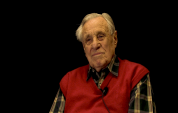3:00 | Ed Cottrell reflects on why he thinks remembering the WWII generation is so important and how the lessons learned 75 years ago are just as applicable today. (Interview conducted at, and with the assistance of, The Veterans History Museum of the Carolinas.- https://theveteransmuseum.org/)
Keywords : Reflection Unity

While WWII was raging, Ed Cottrell knew if he didn’t put his name in he’d end up being drafted. Noting a program to train college students how to fly, he opted to get his license so that if he had to go overseas, he wouldn’t be walking, and the Army Air Corps gave him the best offer. (Interview conducted at, and with the assistance of, The Veterans History Museum of the Carolinas.- https://theveteransmuseum.org/)
Ed Cottrell describes his extensive flight training in the Army Air Corps. He was fortunate to get his choice of flying fighters, and preparing to fly in a war-zone led to him making some risky decisions. (Interview conducted at, and with the assistance of, The Veterans History Museum of the Carolinas.- https://theveteransmuseum.org/)
In late 1944, Ed Cottrell would be sent to Europe to fly P-47s. He describes the journey overseas, as well as the men in his squadron, before they would be given their first missions. (Interview conducted at, and with the assistance of, The Veterans History Museum of the Carolinas.- https://theveteransmuseum.org/)
On December 17, 1944, the Germans were preparing for the Battle of the Bulge. Being stationed at the closest base to Bastogne, Ed Cottrell would fly a mission that would be one of his closest calls during the war. He also tells the story of his late friend Second Lieutenant Art Summers. (Interview conducted at, and with the assistance of, The Veterans History Museum of the Carolinas.- https://theveteransmuseum.org/)
Towards the end of the Battle of the Bulge, the Germans attempted to strike Allied air bases. Ed Cottrell describes the ensuing battle and the desperate measures taken by the Germans as the war moved further out of their favor. (Interview conducted at, and with the assistance of, The Veterans History Museum of the Carolinas.- https://theveteransmuseum.org/)
Later in January of 1945, Ed Cottrell would be flying in support of the 9th Army in Europe. Here he describes one of his first memorable missions where they made passes over German forces in Julich, leaving his plane riddled with bullet holes. (Interview conducted at, and with the assistance of, The Veterans History Museum of the Carolinas.- https://theveteransmuseum.org/)
Ed Cottrell’s last mission was 2 days before the end of the war in Europe, and following that some men in the unit were assigned to fight in the Pacific. Ed got to spend some time at home, but before he could get past San Antonio the war had come to a close. (Interview conducted at, and with the assistance of, The Veterans History Museum of the Carolinas.- https://theveteransmuseum.org/)